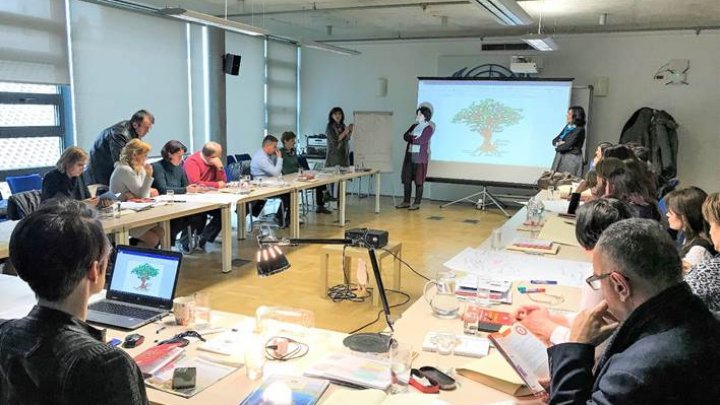FAO, UNDP scale up education on climate change in Montenegro
 foto: FAO
foto: FAO
Around a quarter of human-produced carbon-dioxide is absorbed by the ocean, causing it to acidify and ultimately harming marine life, fishing and tourism. This is just one piece of information that children in Montenegro can learn from the Climate Change Challenge Badge.
The publication was developed and translated to Montenegrin by the Food and Agriculture Organization of the United Nations (FAO) and distributed in the country through an education programme of the United Nations Development Programme (UNDP). The programme has just finished but will continue in the next semester.
“The Climate Change Challenge Badge is a learning package for students from 5 to 18 that gives an overview of where we currently stand with climate change through fun, informal exercises,” explained Reuben Sessa, FAO climate change and energy coordinator and FAO focal point for youth. “In particular, the challenge badge teaches young people how they can change their everyday habits and take action in their local communities to create a generation that has a more sustainable relationship with the planet and create a better world.”
After a short overview on the Sustainable Development Goals and the educational methodology, the handbook is divided into four main thematic sections: climate is life, causes of climate change, impacts, and solutions. Each section is packed with exercises tailored to the needs of different age groups and aimed at helping children better understand this complex issue and motivating them to take action against climate change.
Hard copies of the handbook have been distributed at UNDP’s teacher trainings, which started last year. The workshops, which cover both secondary and primary school teachers, are nationally accredited and were developed to arm teachers with knowledge and skills on this topic.
“So far, we have organized trainings for secondary school teachers, both on social and natural science subjects,” said Snežana Dragojević, programme manager at UNDP Montenegro. “They learned about climate change, its natural and anthropogenic causes, and the consequences at the global level and within Montenegro.”
Teachers’ feedback is generally positive. Smilja Vukicevic, a philosophy teacher from Podgorica, said she was sad when the seminar ended. “I have learned a lot, played a bit, met some wonderful people, spent a day in beautiful venue, surrounded with lot of positive energy and good vibrations!”
Presentations and lectures included practical exercises and guidelines on how to bring the topic to children, a notion that is now backed by the handbook.
“The 140 participants came from all municipalities of Montenegro,” Dragojević said. “In October, we will continue the programme to reach out to more people and cover more topics, specifically climate change mitigation and adaptation in the Montenegrin context, and with new practical teaching methods.”
The publication launch is timely, as the issues of climate change, biodiversity and entrepreneurship have been recently introduced into the country’s curricula as topics that need to be streamlined into related school subjects.
The Climate Change Challenge Badge was produced jointly by FAO and other partners through the Youth and United Nations Global Alliance (YUNGA) initiative.
Besides Montenegrin, the updated version of the badge is available in English, Hungarian, Macedonian, Spanish, Russian, and some other languages.